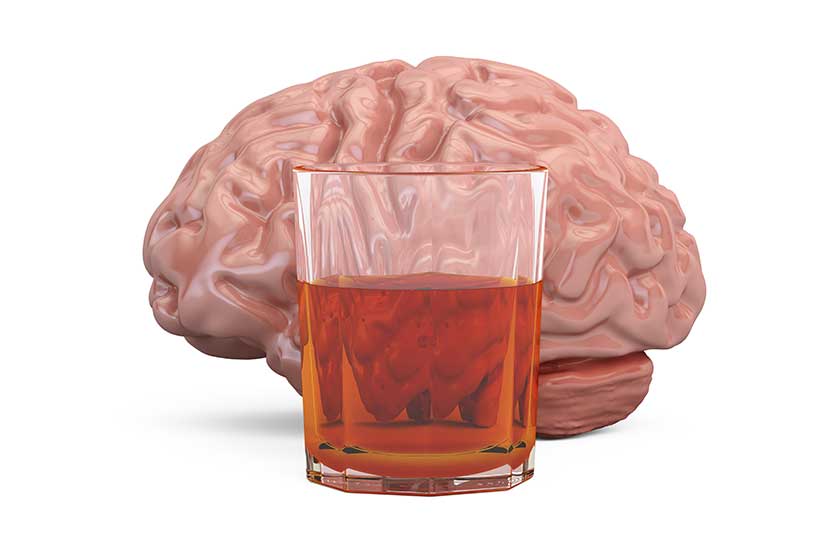The Effects Of Alcohol On The Brain
Alcohol’s effects on the human brain and mental health are often underestimated. In fact, chronic alcohol misuse is strongly linked to long-term learning and memory issues, mental health problems, and even several forms of brain damage.

Alcohol consumption is widely accepted and commonly celebrated in Ohio, leading many to underestimate the effects of drinking alcohol on a person’s body, especially in cases of binge drinking and/or chronic long-term alcohol abuse.
In truth, different levels of alcohol intake can have profound short-term and long-term negative effects on the body as a whole and brain function and brain health in particular.
This may potentially lead to learning or memory dysfunctions, serious mental health disorders, alcohol use disorders (alcohol addiction), Wernicke–Korsakoff syndrome (WKS), and even severe brain damage.
CNS Depression
While alcohol is often considered a separate category from drugs (“drugs and alcohol”) ethanol is a psychoactive drug that acts as a strong central nervous system (CNS) depressant.
This means that alcohol tends to slow down activity in the body and mind, relaxing physical tension and mental stress.
However, the greater the amount of alcohol a person consumes in one sitting, the more likely they are to experience negative effects ranging from impaired thinking, judgment, motor control, and reaction times to confusion, blackouts, amnesia, and even life-threatening alcohol overdose-effects (alcohol poisoning).
Alcohol’s potency as a CNS depressant (along with certain other physiological effects) are also why many medications carry warnings that they should not be used in combination with alcoholic drinks.
Likewise, individuals experience an increased risk of drug overdoses and other negative effects when illicit drug abuse is mixed with alcohol misuse.
Addiction
Along with its effects as a depressant, alcohol also stimulates the release of dopamine in the central nervous system, especially during periods of binge drinking and among those with certain genetic predispositions.
Dopamine is a neurotransmitter related to pleasure and habit-building.
When released due to alcohol consumption, the effects of this dopamine can begin to associate alcohol with fun, stress relief, social engagement, and pleasure, potentially training the brain to crave alcohol more and more over time.
Eventually, this can escalate into an alcohol use disorder, a condition of compulsive and uncontrolled alcohol misuse that continues even after a person is aware of the harm that their drinking is causing them and those around them.
Mental Health Disorders
Compared with light or moderate drinkers, heavy drinkers are at an increased risk for severe psychiatric disorders including major depression, anxiety/panic disorders, personality disorders, schizophrenia, and many more.
And, this relationship between alcohol misuse and mental health issues may develop in both directions.
Those experiencing mental health conditions may use alcohol and other substance use to cope with their condition, leading to co-occurring alcohol use disorders and mental health disorders.
But, at the same time, heavy alcohol use and alcohol addiction can exacerbate mental health problems and disorders in those who may otherwise have not experienced them.
In either case, effectively treating alcohol use disorder can improve a person’s mental health, and managing mental health disorders may also improve one’s reliance on alcohol or other substance abuse in turn.
Impaired Brain Function
Along with an increased risk for diagnosable mental health disorders, heavy alcohol use can, with time, produce numerous serious cognitive issues including memory loss, learning deficits, dementia, and mental confusion.
Heavy drinking, and potentially moderate drinking as well, is even known to cause measurable long-term shrinkage in brain volume.
While brain volume tends to shrink naturally with age, the more a person drinks the more pronounced this shrinkage becomes. The damage is especially evident in the hippocampus, the part of the brain associated with memory and reasoning.
Wernicke-Korsakoff Syndrome
Sometimes referred to as Wet Brain, Wernicke-Korsakoff Syndrome is a pair of disorders that commonly impact those who abuse alcohol consistently over a very long period of time.
Chronic alcohol abuse blocks the body’s ability to absorb thiamine (vitamin b1), leading to a lasting nutritional deficiency. This then triggers the two related stages of the condition:
- Wernicke’s encephalopathy, with symptoms of sudden and acute confusion, movement and coordination problems, and vision problems
- Korsakoff syndrome, a long-term memory disorder caused by damaged brain cells and involving an inability to form memory problems, behavioral problems, confabulation, delirium, concentration problems, and other issues
Unfortunately, even with treatment some aspects of Wernicke-Korsakoff Syndrome may never improve once they begin. Without effective treatment, the condition will become worse and eventually may become terminal.
Treating Alcohol-Related Mental Problems
The best way to treat mental health disorders and neurological problems related to alcohol abuse is to help a person stop drinking and to treat the underlying emotional, physical, and behavioral issues that have contributed to their alcohol abuse in the first place.
If you or a loved one have experienced an alcohol use disorder and you need help getting it under control, we can help. For professional, inpatient dual-diagnosis alcohol use disorder treatment, please contact the Ohio Recovery Center today.
- National Institutes of Health (NIH) https://magazine.medlineplus.gov/article/alcohols-health-effects-what-you-need-to-know
- National Institute of Neurological Disorders and Stroke https://www.ninds.nih.gov/health-information/disorders/wernicke-korsakoff-syndrome#:~:text=What%20is%20Wernicke%2DKorsakoff%20syndrome,(Wernicke%2DKorsakoff%20syndrome).
- National Institute on Alcohol Abuse and Alcoholism (NIAAA) https://www.niaaa.nih.gov/publications/alcohol-and-brain-overview#:~:text=Alcohol%20interferes%20with%20the%20brain%27s,injuries%20and%20other%20negative%20outcomes.

